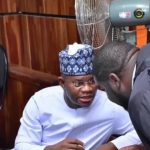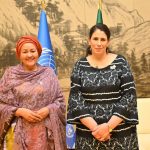Strengthening Nigeria’s Future Through Industrial Clusters and Capacity Building
— A National Call for Deepened Commitment and Strategic Expansion
By Dr. Aiyeku Olufemi Samuel
Co-Founder & Lead Consultant
Global Human Capital & Energy Management Limited
As Nigeria navigates the 21st-century global economy, industrial clusters and strategic capacity-building programs have become key instruments in empowering micro, small and medium-scale enterprises (MSMEs), enhancing productivity, promoting job creation, and strengthening national competitiveness. The push towards local production, innovation, and skill-based development can no longer be delayed — it must be a national urgency.
In recent years, and particularly over the past two years under the administration of President Bola Ahmed Tinubu, Nigeria has made notable strides. There is visible commitment to job creation, industrial development, and entrepreneurship support. However, the depth of impact must match the breadth of vision, and for this, industrial clusters, training, and capacity-building programs must evolve beyond policy statements into measurable, accessible, and inclusive structures.
“A nation that fails to train its people prepares for dependence, not development.”
~ Dr. Aiyeku Olufemi Samuel
Let’s examine the trajectory, commend the progress, identify the gaps, and issue a national call to action.
Commendable Gains Under President Bola Ahmed Tinubu (2023–2025)
We must begin with deep appreciation to President Bola Ahmed Tinubu for his administration’s forward-looking policies on industrialization, especially his:
Support for MSMEs through the Presidential Palliative Loans and targeted grants
Commitment to enhancing vocational and skills training programs nationwide
Facilitation of partnerships between private sector players and government institutions
Inclusion of youth in digital and tech-skill development initiatives
Renewed hope agenda that, though still evolving, reflects intentional governance in industrial development
According to NBS (2024 Q4 reports):
Over 320,000 MSMEs received access to government-backed support or interventions.
Skill acquisition programs under the National Industrial Skills Development Programme (NISDP) trained over 60,000 beneficiaries in two years.
Nigeria’s non-oil exports from MSME-linked production zones rose by 11% in 2024 alone.
These gains must be acknowledged as foundations for transformation — not endpoints.
Special Recognition: Hon. Adamson Oluwatosin Ayinde, SSA to the President on Industrial Training & Development
A visionary within this evolving framework, Hon. Adamson Oluwatosin Ayinde has consistently demonstrated deep commitment and strategic direction in advancing industrial training and skills development. His office has:
Facilitated stronger linkages between industrial training programs and market relevance
Introduced innovative models for community-based industrial clusters
Worked closely with stakeholders to align training outcomes with national productivity targets
Amplified advocacy for skills certification, standards, and employability metrics
Hon. Ayinde’s work deserves special national recognition as a bridge-builder between governance, training institutions, and industry players.
“The future doesn’t belong to those who guess what’s needed; it belongs to those who train for it.”
~Dr. Aiyeku Olufemi Samuel.
Challenges and Pitfalls: Where the System Still Falters
Despite the achievements, glaring issues persist. These include:
Poor infrastructure and lack of sustainable funding for industrial cluster zones
Fragmented and duplicative training efforts by MDAs without synergy
Low follow-up or monitoring of post-training productivity and employment impact
Weak connection between training modules and current labor market demands
Exclusion of vulnerable groups (especially rural youth and women) in implementation
Rhetorical question:
How can a nation develop industries when its people are not industrially equipped?
The answer:
By building systems that not only train, but empower, integrate, and sustain individuals in real economic ecosystems.
Recommendations and Solutions: Making the Future Work
If Nigeria is to truly benefit from its population dividend and natural entrepreneurial spirit, the following actionable recommendations should be urgently implemented:
Establish functional Industrial Cluster Development Authorities at federal and state levels with private sector representation
Introduce regional industrial academies focusing on unique comparative advantages — e.g., leather in Kano, palm in Edo, cocoa in Ondo
Expand funding and tax incentives for companies who establish and sponsor training centres within industrial parks
Deploy digital tracking tools for post-training impact assessment and workforce integration
Institutionalize mandatory public-private partnership frameworks for all government-led training programs
Support the inclusion of non-conventional learners, artisans, and informal workers into recognized certification systems
Narrative Reflection: The Spirit of National Growth
There was a time when every young Nigerian dreamed of becoming a civil servant. Today, the tide is changing — more young people dream of becoming creators, builders, coders, and innovators. But dreams need systems. Hope needs infrastructure. Passion needs direction.
President Tinubu’s administration, despite its economic and structural challenges, has taken a bold step toward industrial transformation. Yet, Nigeria must now double down — from intent to impact, from policies to measurable progress.
“You cannot build a nation without building its builders.”
~ Dr. Aiyeku Olufemi Samuel
Final Call to Action
Let this not just be another policy era. Let it be a national rebirth of skill, industry, and productivity. Let every Nigerian youth, regardless of tribe or status, access a skill that creates income, dignity, and contribution. Let us expand our industrial footprints — not just on paper, but on the ground.
And to the President and his team:
You have begun well. Now deepen the work. Multiply the results. Widen the access. Prioritize the follow-through.
The dividends of democracy will be best measured not by promises made, but by livelihoods transformed.
Dr. Aiyeku Olufemi Samuel
Co-Founder & Lead Consultant, Global Human Capital & Energy Management Limited
Governance Analyst|
Development Economist|
Policy Consultant| Strategic Development Advocate| Climate Action Enthusiast | Sustainability & Impact Investing Specialist|Girl-child Advocacy| PPP & CRM Specialist /Sales Innovation & Transformational Results-Driven Business Analyst
| +234 802 545 1262| 0803 786 6085
aiyekuolufemi@gmail.com












